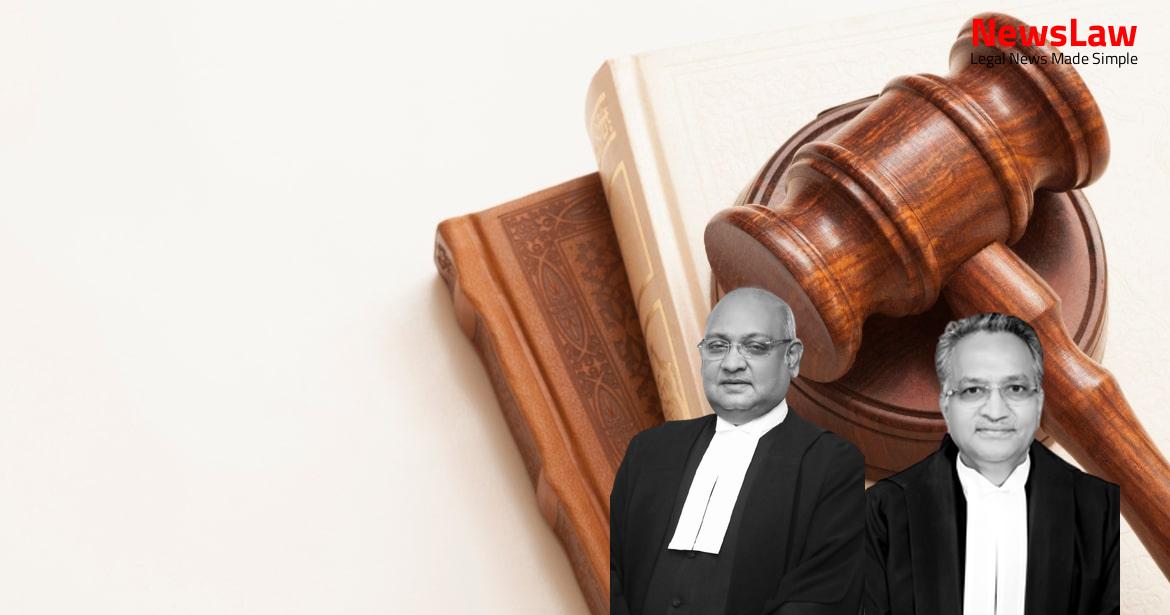In the case of Balaji Chimnaji More vs Babaji Hari Shelar and Ganapati Dhondiba Tapkir, a legal battle ensued over the possession and rights to Watan lands in Village Chikhali. The tenants, Babaji Hari Shelar and Ganapati Dhondiba Tapkir, had been cultivating the land, leading to a dispute with the legal heirs of Balaji Chimnaji More. Ultimately, the Bombay High Court issued a crucial judgment affirming the tenants’ rights under the Tenancy Act, setting a significant precedent in land dispute cases.
Facts
- The Watan property, comprising a 50% share in 20 acres of land and a 50% share in 16 acres of land in Village Chikhali, was assigned to Balaji Chimnaji More.
- Balaji Chimnaji More’s legal heirs sought regrant of the Watan lands under Section 5 of the Abolition Act.
- The tenants, Babaji Hari Shelar and Ganapati Dhondiba Tapkir, had been cultivating the Watan property as tenants since 1955-56.
- Orders were passed by various authorities and appeals were filed in relation to possession and rights over the Watan lands.
- There was a legal dispute regarding the termination of the tenancy and the regrant of possession of the lands to the tenants.
- A series of orders were passed by different authorities regarding the possession and rights over the Watan lands, leading to appeals and revisions.
- The matter was taken up to the Bombay High Court through a writ petition and later a special civil application.
- Ultimately, a revision was allowed by an order dated 03.05.1982, setting aside all previous orders against the tenants and directing restoration of the lands to them.
- Possession of the lands was delivered to the heirs of the Watandar on 24.04.1962.
- The delivery of possession occurred during the pendency of revisional proceedings.
- The delivery was made due to the absence of a stay order from the lower authority.
- The High Court stipulated that such delivery would be subject to the final determination of the rights of the parties.
Also Read: Judicial Oversight in Granting Pre-Arrest Bail to Police Officer
Arguments
- The legal position was affirmed by a learned Judge in the case of Pradeeprao Virgonda Shivgonda Patil vs Sidappa Girappa Hemgire and others.
- It was clarified that a regrant of Watan land in favor of the Watandar does not create a new lease in favor of the tenant.
Also Read: Conflict in Internal Organization of Police Force: Legal Analysis
Analysis
- The Tenancy Act conferred an absolute right upon the tenant in Section 32
- The abolition of Patel Watan did not create a new tenancy
- The legal heirs of the original Watandar could not have lawfully taken possession of the lands from the tenants
- Section 88CA of the Tenancy Act granted exemption to certain Watan lands
- The High Court held that the tenancy was not legally and validly determined
- The Abolition Act and the Tenancy Act were required to be construed harmoniously
- The tenants of Watan lands were entitled to all the benefits under the provisions of the Tenancy Act
- The proviso to Section 8 of the Abolition Act did not divest the tenant of the right of purchase under Section 32 of the Tenancy Act
- The legal heirs of the original Watandar could not have taken lawful possession of the lands from the tenants
- Not all Watan lands were treated as Government lands per Section 88
- Amendments were made to the Tenancy Act enabling the purchase of tenanted lands by tenants
- Explanation was inserted in July 1958 in relation to the clause about customary fees or perquisites for watan lands.
- Provisions of relevant tenancy law shall apply to lawfully leased watan land existing on the appointed day.
- Rights and liabilities of watan property holders and tenants shall be governed by relevant tenancy law.
- Exemption to government lands from certain provisions of the Act.
- Sections 32 to 32-R were introduced in the Tenancy Act.
- Section 32: Tenants deemed to have purchased land on Tillers’ day.
- Restriction on mortgaging, charging, or leasing watan property to non-watandars.
- Section 11 of 1874 Act nullified unauthorized alienations, while Section 11A allowed for summary resumption by the Collector.
- Conditions for adoption of a watan or watan part specified in sections 33 to 35 of the Act.
- Collector’s authority to fix emoluments of officiators and assign watan property towards their emoluments.
- Definition of Watandar as a person with hereditary interest in a watan.
- Explanation under Section 5 clarifying land assignment for service as belonging to the Government.
- The ‘Explanation’ did not amend the provision but clarified its applicability to certain watan lands.
- Limited applicability of the provision to specified watan lands defined by the ‘Explanation’.
- Date of operation of the ‘Explanation’ deemed to be from the date of amendment in August 1956.
- Explanation under Section 23 regarding Service Inams, Cash allowances, and Pensions.
- The order dated 18.04.1961 regarding the Watan land lease did not attain finality as tenants challenged it in higher authorities and their challenge was pending as of the possession delivery date of 22.04.1962.
- The tenants’ challenge to the initial order dated 18.04.1961 was ultimately successful when their revision was allowed on 03.05.1982, rendering the termination of the lease still unresolved.
- The argument that tenants needed to challenge the regrant order dated 27.11.1964 is dismissed, as they actually benefited from this regrant order enabling their right to purchase the land.
- A previous Court decision emphasized that tenants on Watan land, who were lessees before the Tenancy Act, should continue unless the landlord needed the land for personal cultivation or the tenant was in default according to the Tenancy Act provisions.
- The application of Section 32G of the Tenancy Act concerning compulsory purchase could not apply until the land was regranted to the landlord under the Abolition Act, as seen in a different case.
- Revisionary order dated 03.05.1982 correctly invalidating the previous finding
- Tenancy lawfully subsisting on Tillers’ Day, 01.04.1957
- Tenants entitled to exercise statutory purchase rights under Section 32 of the Tenancy Act
- No grounds to interfere with the judgment of the Bombay High Court dated 01.02.2005
Also Read: Supreme Court Upholds Insurer Liability in Fake Driving Licence Case – An Analysis of INSC 954
Decision
- Parties shall bear their own costs in the circumstances
- The appeal is dismissed as it is devoid of merit
- The right became operational on 27.11.1964, when the Watan lands were regranted to the heirs of the original Watandar
- Pending Interlocutory Applications (I.A.s) shall also stand dismissed
Case Title: BABAN BALAJI MORE (D) BY LRS. Vs. BABAJI HARI SHELAR (D) BY LRS. (2024 INSC 203)
Case Number: C.A. No.-008356 / 2017



